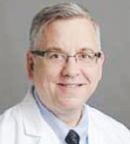
David Graham, MD, FASCO
ASCO expert David Graham, MD, FASCO, of the Levine Cancer Institute in Charlotte, North Carolina, was encouraged by the IMpower131 findings. “This is one more example of how immunotherapy is making steady gains against a number of cancers. Immunotherapy has been shown to be effective in other types of lung cancer, and now we are seeing encouraging improvements in advanced squamous lung cancer, which historically has been very difficult to treat,” he said.
“The results of this trial showed that all comers, regardless of the level of programmed cell death ligand 1 (PD-L1) expression, had a benefit from the immunotherapy combination. This completely flies in the face of what we thought. We previously thought that patients with high levels of PD-L1 alone would benefit from immunotherapy, but the results of this largest randomized trial to date show that this is not the case. A benefit was seen among all groups of PD-L1 expression,” Dr. Graham continued.

Richard Schilsky, MD, FACP, FASCO, FSCT
“We will need longer follow-up on overall survival. If the results of the trial show improved overall survival with the immunotherapy combination, this will be a new standard of care for the front-line treatment of patients with squamous non–small cell lung cancer [NSCLC],” Dr. Graham said. “The fact that we are discussing which good therapies to use in NSCLC is something we couldn’t have conceived of 10 years ago,” he added.
Numerous ongoing trials are exploring different immunotherapy combinations. “With so many PD-L1 inhibitors approved for lung cancers, it is getting hard to think about which drug to use for which line of therapy,” commented ASCO Chief Medical Officer, Richard Schilsky, MD, FACP, FASCO, FSCT. ■
DISCLOSURE: Drs. Graham and Schilsky reported no conflicts of interest.

